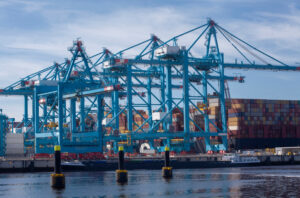Maritime Research & Innovation UK (MarRI-UK) has welcomed the government’s Maritime 2050 strategy, the scheme announced last week to turn the UK into a pre-eminent global test bed of emerging technology.
In a statement MarRI-UK, a body with the intention of promoting the interest of the maritime industry, says the initiative, which PTI reported on when it was unveiled, is a “very positive development” in the UK’s maritime policy.
It goes onto say that maritime sector innovation is not currently coordinated or attuned to national priorities.
Furthermore, the diverse nature of the UK’s maritime sector has meant that innovation investment has lacked scale in comparison to other similarly sized sectors in the UK.
MarRI-UK, in particular, points out the creation of a national innovation centre which, it says, will provide a channel to address some of the big global challenges the industry is facing.
Harry Theochari, Chair of Maritime UK, hailed the initiative.
A recent Port Technology technical looked at the potential for smart ports and technologies
“Maritime 2050 rightly challenges us to collaborate to realise the opportunities ahead; whether that’s on autonomy, low-cabon technologies, or elsewhere,” Theochari said.
“MarRI-UK will deliver a truly national network of maritime innovation hubs – building upon the capacity and expertise of our universities and world-leading companies.
“In MarRI-UK, industry and government have a credible collaborative vehicle to deliver key technology recommendations from Maritime 2050.”
'Maritime 2050 is a blueprint to take us forward' #Maritime2050 https://t.co/5XLtgi3lxR pic.twitter.com/LFcld85sQh
— Maritime UK ���� (@MaritimeUK) January 25, 2019
The British Ports Association (BPA) also praised the government’s strategy and says it will support it in “any way it can”.
Richard Ballantyne, BPA’s Chief Executive, said: “We welcome this ambitious strategy and the Government’s confidence and aspirations for the UK’s innovative and important maritime sector.
“As an island nation with a proud maritime heritage it is important that Government is not complacent in setting out what it can do to support the sector over the next three decades by encouraging more young people to see the immense value in maritime careers and building and maintaining a business environment where our independent and commercially-run ports can continue to innovate and invest.
A Maersk vessel at the Port of Felixstowe, UK
“Many of the measures announced are short term but will lay the foundation for a more stable and productive industry in the medium and long term.
“Whilst we note the lack of specific funding for some projects, we welcome the Government’s intent in taking forward some important projects including the full implementation of the Port Connectivity Study in England and the new ‘Port Economic Partnerships’, which we are keen to learn more about. We hope that these partnerships will offer a vehicle for turning the industry’s Port Enterprise and Development Zones into reality.
“We are also pleased to see some overlap with our own Port Futures programme particularly around smart and autonomous shipping and ports.
“We look forward to working with and supporting the Government as it builds on this strategy in the months and years to come.
We are delighted that the Government has published an ambitious long term strategy for the UK's vital maritime sector. Read our full response here: https://t.co/r7VXoYDA5e https://t.co/S2KWu8dHxs
— British Ports Association (@britishports) January 24, 2019
“We are keen to make progress in the areas identified and get going on a range of issues, from promoting a more innovative planning framework to increasing diversity and mapping the seabed – which will support better environmental and planning decisions as well as facilitating growth in marine industries.”











